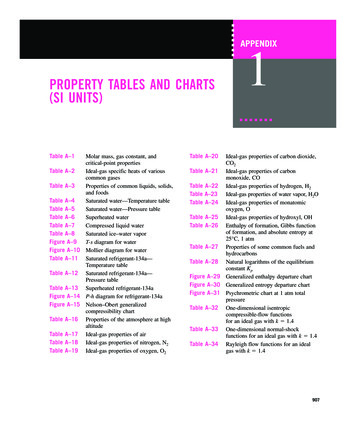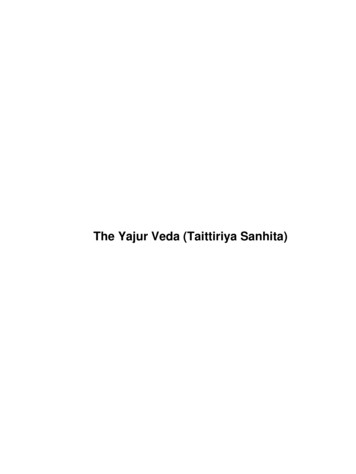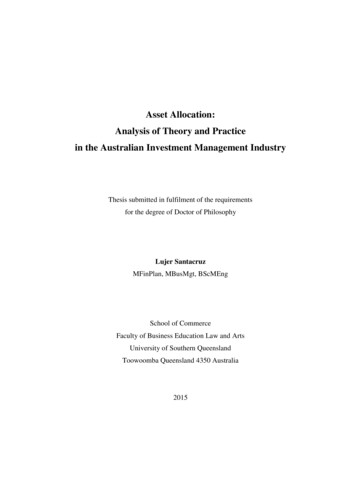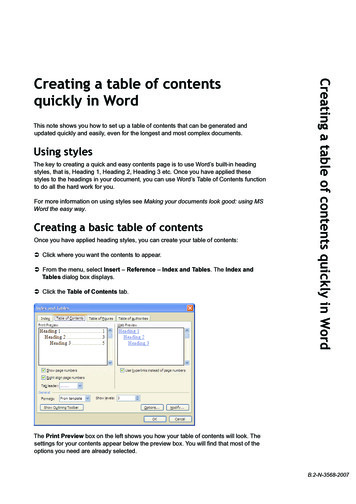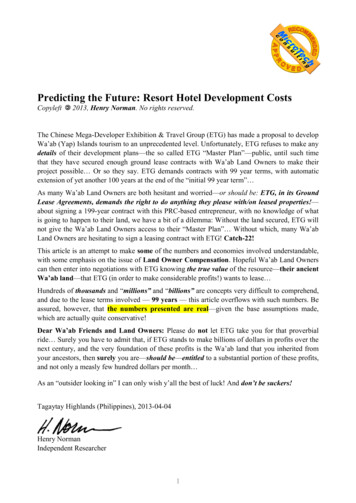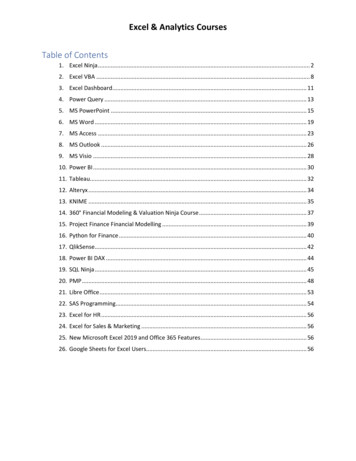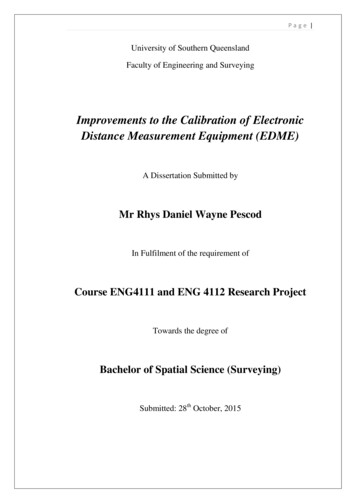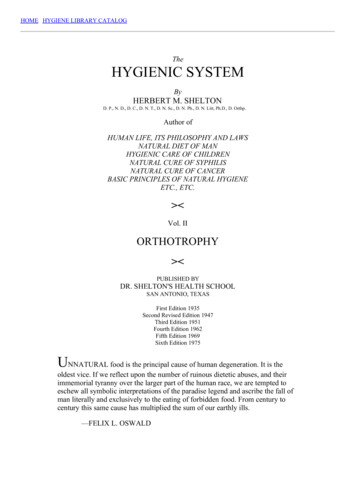
Transcription
HOME HYGIENE LIBRARY CATALOGTheHYGIENIC SYSTEMByHERBERT M. SHELTOND. P., N. D., D. C., D. N. T., D. N. Sc., D. N. Ph., D. N. Litt, Ph.D., D. Orthp.Author ofHUMAN LIFE, ITS PHILOSOPHY AND LAWSNATURAL DIET OF MANHYGIENIC CARE OF CHILDRENNATURAL CURE OF SYPHILISNATURAL CURE OF CANCERBASIC PRINCIPLES OF NATURAL HYGIENEETC., ETC. Vol. IIORTHOTROPHY PUBLISHED BYDR. SHELTON'S HEALTH SCHOOLSAN ANTONIO, TEXASFirst Edition 1935Second Revised Edition 1947Third Edition 1951Fourth Edition 1962Fifth Edition 1969Sixth Edition 1975UNNATURAL food is the principal cause of human degeneration. It is theoldest vice. If we reflect upon the number of ruinous dietetic abuses, and theirimmemorial tyranny over the larger part of the human race, we are tempted toeschew all symbolic interpretations of the paradise legend and ascribe the fall ofman literally and exclusively to the eating of forbidden food. From century tocentury this same cause has multiplied the sum of our earthly ills.—FELIX L. OSWALD
8.49.50.Philosophy of NutritionFood ElementsThe Minerals of LifeVitaminsCaloriesLaw of the MinimumOrganic FoodsOrganic AcidsFruitsNutsVegetablesCerealsAnimal FoodsDrinkCondiments and DressingsSalt EatingFruitarianism and VegetarianismNature's Food RefineryThe Digestibility of FoodsMental Influences in NutritionEnjoying our FoodAbsorption of FoodUses of FoodHow Much Shall We EatHow to EatCorrect Food CombiningEffects of CookingUncooked FoodsSaladsConservative CookingEffects of Denatured FoodsUnder NutritionHypo-AlkalinityDiet Reform Vs. Supplemental FeedingBeginning the Reform DietFeeding MothersBuilding the TeethThe Elimination DietFeeding in DiseaseThe Three Year Nursing PeriodCow's MilkPasteurizationMother's MilkShould Baby Be WeanedNo Starch For InfantsThree Feedings A DayFeeding of InfantsFeeding Children From Two to Six YearsMan Shall Not Diet With Food AloneOur Denatured Soil
To my three children: Bernarr Herbert, Walden Ellwood and Willowdeen LaVerne, whose rugged health, sunny dispositions, mental alertness and unusualstrength are due to Hygienic Principles and Practices; who have escaped most ofthe superstitions that are the curse of child-life of today; who have escaped thecrippling influences of Modern Medicine; and give great promise for the future,this book is lovingly dedicated by:--THE AUTHORONLY unnatural appetencies have no natural limits, and a combination ofdietetic restrictions with the one-meal plan would enable us to dispense with thesickening cant of the saints who ask us to make our dinners as many ordeals forthe exercise of self-denial. "It would justify suicide," says an educationalreformer, "if this world of ours were really arranged on the diabolic plan ofmaking every gratification of our natural instincts injurious.""Stop eating whenever the taste of a special dish tempts you to unusualindulgence." . . ."In saying grace, add in silence a pledge to prove your self-control;" "test thesuperiority of moral principles to physical appetites," and similar apothegmsrecall the time when moralists tried to earn heaven by trampling the strawberrypatches of earth and obtain forgiveness for erring at all by mixing their food witha decoction of wormwood. "Stop eating when you relish your food more thanusually!" Negro et pernigo! We might as well tell a health-seeker to refrain fromsleep when he feels specially drowsy."Regulate the quality of your meals and let the quantity take care of itself," is afar more sensible rule. Wholesome food rarely tempts us to indulge to excess. Wedo not often hear of milk topers or baked-apple gluttons."Do not eat till you have leisure to digest," but after a fast-day, and with allnight for digestion and assimilation, do not insult Nature by being afraid to eatyour fill of wholesome food. If a combination of exceptional circumstancesshould, nevertheless, result in a surfeit, do not rush to the shop of the bluepillvender, but try the effect of a longer fast.—FELIX L. OSWALD.
HOME HYGIENE LIBRARY CATALOG GO TO NEXT CHAPTERIntroductionAmong the civilized as among savages, social activities center about sex and food. Civilization grew upin fertile sections, where food was abundant--where food was scarce nomadic tribes roamed in savagery orsemi-savagery. Man's food and his ways of procuring his food have largely shaped his whole social,political and religious history.The study of food and its relations to the structures and functions of the body constitutes one of the mostimportant subjects that can occupy our minds. It is unfortunate that the knowledge of diet possessed by theancients was permitted to perish during the Christian era and people were taught to "take no thought ofwhat ye shall eat or drink," for "it is not what goeth into a man's body, but that which cometh out thatdefileth him."It is now over a hundred years since the study of food was revived and, while much valuable knowledgehas been accumulated during that time, it has been slow in reaching the minds of the people. The spread ofsuch knowledge has met with organized opposition from the medical profession, which has been able tokeep many people in almost complete ignorance of how to feed their bodies.Modern dietary science (trophology) may be said to have had its beginning with Sylvester Graham, andhis Lectures on the Science of Human Life is still abreast of our time in most particulars. If you want "thenewer knowledge of nutrition," you'll find most of it in this book.It will be recalled that in Vol. I of this series we recounted Graham's experiences in preventing choleraby dietetic and general hygienic means and how the movement initiated by him grew and spread. Despiteits overwhelming success, the medical profession, as stubborn then as now, in its opposition to dietaryadvancement, heaped ridicule and slander upon Graham and the Grahamites.In his efforts at diet reform, as in all of his other efforts at living reform, Graham ran up against thestone wall of established prejudices and practices and the active opposition of vested interests who saw inhis efforts a serious threat to their incomes and investments. Not the least of these interests was themedical profession.From Europe the early American settlers had brought the idea that fruits and vegetables and, especiallyuncooked fruits and vegetables, were to be avoided. The New York Mirror warned, Aug. 28, 1830, thatfresh fruits should be religiously forbidden to all classes and especially to children. Two years later thesame paper carried the information that all fruit is dangerous and, because of the cholera epidemic citycouncils prohibited their sale in the cities. "Salads were to be particularly feared." Robley Dunglison, thefamous physiologist of the period, appears also to have shared this view.In August 1832 the Board of Health of Washington, D. C. prohibited, for the space of ninety days, theimportation into the city of "cabbage, green corn, cucumbers, peas, beans, parsnips, carrots, egg plants,cimblings or squashes, pumpkins, turnips, water melons, cantaloupes, muskmelons, apples, pears, peaches,plums, damsons, cherries, apricots, pineapples, oranges, lemons, limes, coconuts, ice cream, fish, crabs,oysters, clams, lobsters and craw fish."The following articles the Board have not considered it necessary to prohibit the sale of, but even thesethey would admonish the community to be moderate in using: potatoes, beets, tomatoes and onions."Beef, bacon and bread, with beer and wine were about all they left for the people of Washington to eat.The Board said that the prohibited articles, "are, in their opinion highly prejudicial to health at the presentseason." The Board were probably afraid that these wholesome foods would cause ague, chills, fever andeven cholera.
In that very year (1832) Dr. Martyn Paine, of the New York University Medical School was arguing thatgarden vegetables and almost every variety of fruit had been known to develop the deadly cholera and thatto avoid it the people should restrict themselves to lean meat, potatoes, milk, tea and coffee.It was in New York City in 1832, the very year that the cities were prohibiting the sale of fruits andvegetables because they cause cholera, that Graham launched his attack upon the false beliefs concerningfruits and vegetables and endeavored to induce Americans and, indeed, the world, to eat more fruits andvegetables and cease eating animal foods.Graham not only challenged the view that fruits and vegetables cause cholera and that plenty of meatand wine will prevent it; but he declared that a diet of fruits and vegetables with entire abstinence from allalcoholics, tobacco, condiments, etc., and from all animal foods, was the best preventive of cholera.It is interesting to note, in this connection, that Graham's first observations of the effects of diet uponhealth were made in Philadelphia and related to the part a vegetable diet apparently played in preventingCholera. A small sect of Bible Christians had migrated from England to Philadelphia. These peopleabstained from all animal foods--flesh, eggs, milk, cheese, etc.--and from all condiments and stimulants.They used no tea, coffee, alcohol or tobacco. It was their view that flesh eating violated the first commandgiven by God to man--the instruction to Adam that he should eat the fruit of the trees of the Garden.Ten years before Graham lectured in Philadelphia for the Pennsylvania Temperance Society, this cityhad experienced a severe epidemic of cholera. There were many cases with a high death rate. Contrary towhat was expected from the medical teachings of the time, not a single member of the Bible ChristianChurch had cholera. This fact made a deep and lasting impression upon Graham and caused him to turnhis attention to the study of diet. No longer was he a mere temperance lecturer. His first series of lecturesgiven the following year in New York were upon the causes and prevention of cholera. So radical andrevolutionary did his lectures seem to the medical profession and most of the educated people of the timethat it required nearly another quarter of a century for them to discard their false notions about vegetablesand fruits causing cholera and concede that Graham may have been right. Fallacy dies slowly. Deeprooted prejudices are not easily uprooted. Old habits are not quickly abandoned. The world's leaders do notlike to admit that they have been wrong and have been misleading the people. They did not give upwithout a struggle--indeed, it may be truthfully said that they nave not given up entirely to this day.Many who heard Graham's lecture followed his advice and, thereupon, the physicians, butchers andothers of New York reported that the Grahamites were dying like flies of the cholera. Graham returned toNew York and being unable to find a single instance of death from cholera, and only one or two instancesof cholera (these in people who had not carried out his advice) among those who had adopted the plan ofeating and living he offered, challenged, through the public press of the city, his traducers to bring forth acase of death among his followers. This they did not and could not do, but they did not cease to peddle thelie.Graham pointed out in reply that in America, where animal food is almost universally consumed inexcess, and where children are trained to the use of it, even before they are weaned, scrofulous affectionsare exceedingly common, and lead to that fearful prevalence of pulmonary consumption, which hasrendered that complaint emphatically the American Disease." In addition to this, Graham pointed to "wellfed vegetable-eating children of other countries in all periods of time" and to examples of "feeble andcachectic children, and even those who are born with a scrofulous diathesis," who had been "brought intovigorous health on a well ordered vegetable diet, under a correct general regimen" as proof that the "verybest health can be preserved in childhood without the use of flesh-meat."Graham was an educated man and the same can not be said of most physicians of the period. It werefolly to say to a man who knew the history of Sparta, that health and strength cannot be built andmaintained on a vegetable diet.The people were not all fools and the colleges and universities were not then, as now, dominated by bigbusiness interests. The teaching profession gave strong support to the movement for diet reform. ProfessorReubin Mussey of Dartmouth College openly advocated vegetarianism and invited Graham to address the
students of Bowdoin College and also to speak in Hanover. Professor Edward Hitchcock delivered a seriesof lectures on diet and regimen in Amherst College and these were enthusiastically received by thestudents. Even the unexpected happened: The Boston Medical and Surgical Journal, a conservative andestablished periodical, endorsed his cause in its issue of Oct. 21, 1835 and declared that Graham'sintroductory lecture in Boston would have reflected honor upon the first medical men in America. Nodoubt the Journal later repented of this serious breach of medical ethics, for its editors missed fewopportunities to lampoon Graham, although accepting an occasional article from his pen.The fear of the produce of garden and orchard lingered on for many years after Graham's work began.Indeed, the author recalls many stories of how water melons, cantaloupes, cucumbers and a few otherfruits and vegetables cause malaria, which he heard when a boy.During the cholera year of 1849 the Chicago Journal strongly condemned the city council of that city,for not prohibiting the sale of fruits and vegetables as had been done in other cities, since, as the Journalsaid, the "sad effects," of using such foods were "so apparent." The Democrat carried the story of twoboys who ate freely of oranges and cocoanuts and then went to the circus. "In a short time one was acorpse and the other reduced to the last stage of cholera." Even as late as 1867 it was reported by the pressthat someone by merely passing a fruit stand laden with spoiled peaches had suffered an 'attack" of thegripes, a not impossible psychic reaction. But they reached the conclusion that "if bare proximity to thosepeaches caused him so much pain, the eating of them would have been certain death." Today we witness asimilarly asinine procedure in the prohibition of the sale of raw milk in the cities.Certain of the old physio-medical physicians condemned the eating of tomatoes because these containedcalomel; lettuce was long said to contain opium; acid fruits were held responsible for rheumatism, arthritisand other "acid diseases." Apples were condemned by many physicians because they "derange digestion."I recall hearing one aged physician (this was over thirty years ago) telling of the evils of apples and say: "Iwould rather give my patients a dose of poison than to give them apples." He was daily dosing them withpoisons, though withholding apples."Medicine" does not easily give up; it does not readily admit its mistakes. If Graham and his co-workersand successors had demonstrated that fruits and vegetables were not dangerous and they did not producecholera and other "diseases," the profession of medicine would find other reasons for rejecting these foodsand sticking to their meats and meat soups. They invented the idea that while these things may be pleasingto the sense of taste they have no food value.As late as 1916 we find Dr. Richard C. Cabot of Harvard writing: "Lettuce for instance, is a foodpractically without value--nice and pleasant to look at, and valuable so far as it has dressing (made withoil). But the dressing is the only thing that has any food value." Also: "Tomatoes are ninety-four percentwater; there is hardly any nutrition in them." These statements are typical of the medical view of fruits andvegetables in general.In their efforts to discourage the eating of uncooked fruits and vegetables the regular profession picturedthese as reeking with typhoid germs and the germs of other diseases. Cooking was necessary in order todestroy these germs. Lettuce, now shipped all over the country and eaten raw by everybody, wasespecially covered with hidden dangers in the form of disease germs. Not until the discovery of vitaminsdid the medical profession lose its fear of germs on vegetables and fruits sufficiently to enable it tosanction the use of uncooked foods. Even so, they never mention Graham, except to ridicule him.But it was too late to stop the civilized world from eating fruits and vegetables. Graham and the otherfood reformers had done their work too well. The annual per capita consumption of plant foods was then,and still is, increasing. The medical profession still opposes vegetarianism and continues to insist upon theuse of meat and meat soups, but they have lost on all fronts and have been forced to acknowledge the valueof the fruits and vegetables, even if they do continue to ignore Graham.When the discovery of vitamins was first announced, the physiologist, Professor Percy G. Styles, statedthat the theory is a restatement of Graham's views. Professor Styles was probably duly penalized for thisbreach of scientific ethics; for, apparently, neither he nor anyone else has dared reaffirm such a scientific
heresy. The medical and so-called scientific crowd have long since decreed that "nothing good can comeout of Nazareth" and with derisive scorn they point to Graham, when they condescend to notice him at all,and ask: "is not this the carpenter's son?" It is agreed that no discovery is a discovery unless it is made byone of the boys in the inner circle of ''science." If they have not educated him; if he teaches not theirdoctrines; he is unworthy of a place in the Hall of Fame; or, is it the Hall of Infamy in which the"scientists" sit?Graham made the "mistake" of offending the bakers, millers, brewers, distillers, saloon keepers, tobaccogrowers and sellers, butchers, packers, etc. There was no dairy industry then, but had there been one themembers of this would have joined in the effort to mob him as they now join in the conspiracy of silenceagainst him. Despite professional opposition and the opposition of the vested interests who saw theirinterests threatened, Graham's work prospered and grew. Soon he had many helpers, among them, Dr.Trall.In his Hydropathic Encyclopedia, 1851, Dr. Trall declared to the world that all fresh fruits and greenvegetables are antiscorbutic (opposed to the development of scurvy). Trall soon joined Graham in hiscrusade for vegetables and fruits and whole grain bread and against meat, eggs, milk, white bread, wines,narcotics, etc. Graham died in 1851. Trall carried on until his death in 1879. By this time the workers weremany. Dr. Jennings joined them early in Graham's crusade. After Dr. Trall's death, Drs. Page andDensmore added to our fund of knowledge about trophology.The next great advance in our trophologic knowledge came in 1891 when Dr. H. Lahmann, of Germanypublished his Dietetsche Blutentmischung, in which he presented the results of his investigations of the"ash" (minerals) of food. Lahmann was a German "regular" practitioner who had forsaken the pill bagsand poison bottles and joined Louis Kuhne in his establishment. Lahmann gave us our first real knowledgeof the value of food minerals. His work was rejected by the medical profession, though eagerly acceptedby Hygienists and "faddists," with whom he had associated himself. Forty years ago Dr. H. Lindlahrbrought Lahmann's discoveries back to America with him. Otto Carque and Alfred W. McCann quicklyseized upon this new advance and began the work of acquainting the American public with it.Ragnar Berg, a Swedish chemist, associated himself with Lahmann and began the development of theworld's greatest food scientist. Lahmann died, but Berg still carries on. Lahmann's sanitarium fell into thehands of others. Lahmann's work was declared obsolete, the institution was given over to "experiments ala Steinach" and Berg was discharged.It should be borne in mind that "with the exception of certain investigations made by Ragnar Berg,absolutely no research of any kind has been undertaken on the complete metabolism of the mineral salts,either in man or animal."--The Physiology of Nutrition, London, 1927.Within recent years laboratory workers have attacked the subject of diet and these have added to ourdetailed knowledge of foods if not to our practical knowledge. These experiments have now been carriedon long enough that we feel safe in asserting, on the strength of their results, that foods are really good toeat and that they do actually nourish the body. We feel safe in going even further and asserting that wemust have foods to grow.These "biochemists" discovered that cabbage, lettuce, celery, tomatoes, apples, oranges, etc., are reallyvaluable foods. Their discovery so shocked and surprised the medical world that it completely forgot thatthe "faddists" had been eating these foods for a long time and had declared them to be superior to whiteflour, salt bacon, pigs knuckles, sausage, lard pies and coffee. It was really a remarkable discovery--allthey now need to do is to become "faddists" with the rest of us and make use of the things Graham, Trall,Alcott, Densmore, Page, Oswald, Kuhne, Lahmann, Berg, etc., had long taught.Much of the experimental "findings" is sheer nonsense. Many of the experimenters are subsidized byinterested commercial firms. There are many green vegetables that are as valuable as spinach, but nonethat have "growers" organizations back of them to subsidize research. The manufacturers of yeast, of codliver oil and halibut-liver oil have subsidized research workers. So have the big milk producingcompanies. The same is true of the citrus industry. The gatherers and sellers of sea weeds have their
scientific prostitutes also. When we see some special food heralded as an apple from the "Tree of Life"and see its value over-emphasized in books, magazines, newspapers and in physicians and "research"workers' reports we may be sure that there is money behind it.The work of the biochemist tends to center around the vitamins and is confined largely to animalexperimentation. It lacks the importance possessed by the work of those who feed human beings and whodo not confine their attention to one food factor, but attend to the whole diet and to the whole program ofeating.I do not desire to minimize the serious work of the laboratory experimenters, but I would call attention tothe fact that the "faddists" have preceded them with a whole series of much more important experiments.The "faddists" are of all varieties and kinds and they have many different notions and practices. Theyhave, in other words, carried out, in human beings, many dietetic experiments. Some of these experimentshave involved thousands of individuals and three or four generations. These experiments and their resultsare not to be lightly cast aside because those who make them lack training in the diploma mills ofmedicine, or because they were not "controlled." Hail to the faddists! They have performed a necessarywork.In this work we do not intend to ignore the work of the "faddists" but shall make use of it just as we shalldraw upon the work of the laboratory men to confirm the findings of the "faddists." For it was the"faddists" and not the "bio-chemists" who initiated the movement for dietary study and reform and, who,by their results, compelled the medical world to take notice. Except for the "faddists" the "biochemists"may not have been born.The medical profession showed no interest in dietetics until an awakened public demanded to know howto feed itself. Trophologists were ridiculed as faddists, fanatics, extremists and unqualified practitioners,or quacks by the medical fraternity.Dr. Trall's words in his Hydropathic Cook-Book (1853) are still true: "However strange may seem theassertion, it is nevertheless true, that the philosophy of diet has never been taught in medical schools!Physicians generally are as profoundly ignorant of the whole subject as are the great masses of people."Back in 1916 Dr. Richard C. Cabot, one of the outstanding physicians of the world, wrote: "Almostnothing is known about diet. There are numerous books on the subject which are useful for pressingleaves, but not for much that they contain." I believe that Dr. Cabot's evaluation of medical literature ondiet was correct at the time he first published his statement and that the condition has not greatly improvedsince.In Nov. 1926, R. G. Jackson, M.D., Toronto, Canada, declared that although diet had "long been ignoredand its few advocates been relegated to the category of 'cranks,' proper feeding is beginning to berecognized by the medical profession as a most important adjunct to our therapeutic armamentarium." Headds: "Diet was not 'scientific medicine,' therefore it was not anything. And besides, diet was a measureadvocated by 'cults' outside the profession; therefore it ought to be frowned upon."Note that Dr. Jackson recognizes that his profession are accepting diet merely as an adjunct to their"therapeutic armamentarium," and not as a very foundation stone of life and health. He adds: "Moreover,modern dietetics is not the creation of our profession. It has been developed in its scientific aspects largelyby our friends, the biochemists, and through them almost forced upon us. But now our authorities arebeginning to put their O.K. upon it and marking it as their own; so it becomes respectable and will soonbelong to 'scientific medicine'."The "bio-chemists" entered the field of dietetics at a rather late stage and have succeeded, by laboratoryexperiments, in confirming practically the whole of the trophologic philosophy and practice of theHygienic school. They, like Dr. Jackson, omit to mention this fact, however, in their public writings.There is not a medical college in the United States that has a course in dietetics and the number ofphysicians who make an effort to acquire a knowledge of dietetics after graduation is exceedingly small.
They usually plead lack of time and opportunity, but they find time and opportunity to play golf, takepost-graduate courses in other and much less important subjects and even to go abroad. Dr. PhillipNorman ascribes their persistence in ignorance of how to feed the body to a lack of interest in the subject.Dieting has never been an essential part of a physician's prescription and physicians have never knownand do not know anything about diet, as they so freely admit. Eighteen years ago doctors were stillridiculing those who advocated dietary measures. Thirteen years ago it was still not a factor in thetreatment of the sick and occupied no place in the discussions in medical journals. Much fun was poked at"diets," "dieting," and "diet systems" by the regular medical profession until it suddenly dawned on themone fine day that the people were asking for diet. Today it is a factor in the care of patients in the practiceof only a few physicians, has just reached the point of discussion by the profession and is still subject toridicule by many of the dignitaries in the profession.Despite their confessed ignorance of diet, despite their lack of training in dietary science and their lack ofexperience in dietary practice, they are ever ready to assume an air of pontificial infallibility in theircriticisms of those of us who do employ a knowledge of food science in our care and feeding of the welland the sick. Some of our medical critics, some of the leaders in the ranks of materia medica, accuse "dietfads" of causing "nutritional diseases," "metabolic disorders" and cancer. Diet "fads" cause fewer evilsthan poisonous drugs, putrid serums, rot vaccines, dirty soups, and unnecessary surgical operations.Although freely admitting that they know nothing of diet and of trophology, they declare "it's all wronganyway."Another objection frequently met with is that "only a fool will bother about his diet when he is the rightweight, sleeps well, enjoys life and is happy." This objection assumes either that correct eating is only forthe invalid, or, else, that one should not make an effort to preserve his health, but should eat haphazardlyuntil he becomes ill and then should try to restore his health. The intelligent person will seek to preventrather than remedy ill health.It too often happens that when a medical man does become interested in dietetics he absorbs as much ofthe work of the Hygienic school as he can and passes it out to the public as his own. For example, some ofthem tell us that they "have found" that raw starch is digestible and that it is not well to eat proteins andstarches at the same meal, but they forget that those they decry as "faddists" preceded them with thesediscoveries.I do not want to be understood as saying that there are no medical men who possess a knowledge of diet.The leaven is at work in the profession and its more progressive and honest members have seen the lightand have shown the rare courage that is required to break with professional precedent and follow thatlight. I am happy to have a number of such men, in various parts of the country, among my friends. Tothese men, I look with confidence, to lead their profession out of its self-imposed darkness. But for thegreat mass of physicians there is no newer knowledge of nutrition. They make no advance in dietaryscience. Indeed, some of their leaders labor to prove that the discoveries in the field of diet only reveal thatthey were feeding correctly all the time. It is lamentable, but true.A tubercular specialist wrote a booklet a few years ago on feeding in tuberculosis. He briefly reviews thehigh-lights of dietary research and says that these findings only prove that they have been fee
34. Diet Reform Vs. Supplemental Feeding 35. Beginning the Reform Diet 36. Feeding Mothers 37. Building the Teeth 38. The Elimination Diet 39. Feeding in Disease 40. The Three Year Nursing Period 41. Cow's Milk 42. Pasteurization 43. Mother's Milk 44. Should Baby Be Weaned 45. No Starc

